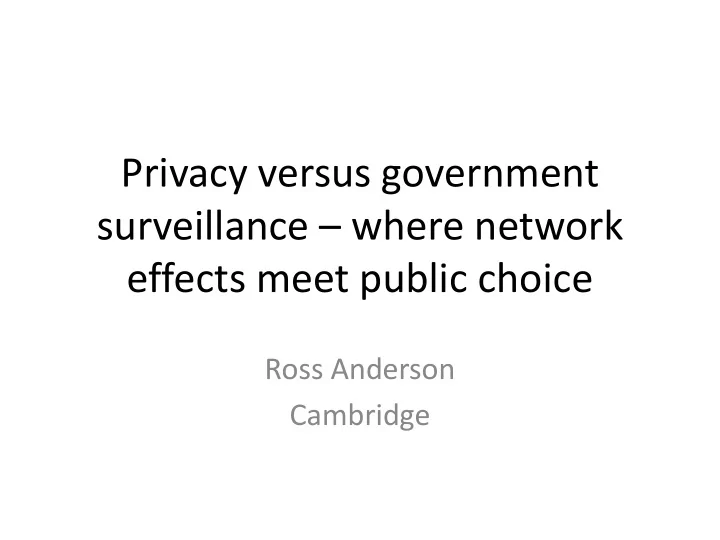

Privacy versus government surveillance – where network effects meet public choice Ross Anderson Cambridge
Two views of money and power • The Bay Area view: money and power are all about network effects, which help you create a platform to which everyone else then adds value • The Washington DC view: power is about having more tanks and aircraft carriers, which is founded on taxation capacity • Almost no-one talks of network effects there, or among scholars of government!
Is this changing? • 1980s: a non-aligned country like India is a democracy, but buys its jet fighters from Russia because they’re cheaper • 2000s: Snowden tells us that India shares intelligence with the NSA rather than the FSB, as the NSA’s network is bigger • The “five eyes” is maybe 15 eyes, or 30 eyes, or 65 eyes …
View since WEIS 2002 • Three things make IT industries monopolistic: – Network effects – Low marginal costs – Technical lock-in • Each of these makes dominant-firm market structures more likely • Together, they make them much more likely • They also explain security and privacy failures
View since WEIS 2002 (continued) • In a market race, you open your system to appeal to complementers such as app writers • Once you’ve won the race, you lock it down to extract rents • In one market after another – mainframes, PCs, routers, phones, social network systems – security is added later • Its design ends up aligned with the platform’s interests almost as much as the users’
Economics of privacy • Privacy suffers from the same problems as security, and more • Asymmetric information: users don’t know much about what gets done with their data • Hyperbolic discounting: many users don’t care about long-term effects of disclosure • Firms that depend on mining private data go out of their way to not make privacy salient
Now – economics of surveillance? • The concentration of the industry into a few large service firms (MS, G, Y, FB …) made the PRISM program foreseeable (except in its details) • The concentration of the telecomms industry into a handful of large operators similarly made TEMPORA foreseeable (and its was described by several journalists in its earler form of ‘Echelon’) • But that’s not all!
Information economics and defence (1) • Network effects do matter in the defence / intelligence nexus! • Neutrals like India prefer to join the biggest network • Network effects entangle us with bad states which use the same surveillance platforms (see rows over exports to Syria)
Information economics and defence (2) • Medieval warfare was all run on marginal costs (40-60 days service for every peasant) • WW1: sent millions of men to Germany • WW2: hundreds of thousands, plus lots of planes, tanks and other capex • Now: to kill a foreign dictator you can use a $30,000 Hellfire missile • But we rely on trillions of capital investment
Information economics and defence (3) • Complex technical lock-in games • 1980s: it was basically about ammunition and spares • Now: are you using Cisco or Huawei? • Very expensive try to build independent infrastructure for government networks • Even so, shared code can lead to shared attacks
Intelligence network governance • Core is 5 eyes; expanding circles of others • Governance: each agency could decide whether to minimise its citizens’ personal data • Only Canada did so! • So GCHQ happy for NSA to read my medical records, and NSA happy for GCHQ to read yours!
Law enforcement network governance • Various models from Interpol through mutual legal assistance treaties • Very slow and cautious: requests vetted by both governments, often several agencies • Much effort on accelerating the process, e.g. via personal links created from NCFTA training and exchange programs
One network or many? • Networks tend to merge: the Internet absorbs everything else • Will the intelligence network and the law- enforcement network become one? • Already intel resources are used for rapid solution of exceptional crimes • NTAC and the Communications Data Bill • PRISM
Network effects in civil government • Example 1: the EU smart metering programme, which aimed at energy efficiency and demand response, but was fragmented by national energy markets • Example 2: the EU itself as a customs union, which ends up imposing its legislation de facto on neighbouring states (Norway, Iceland, Switzerland …)
The IR Community • Realists (Thucydides, Machiavelli, Hobbes, Kissinger …) vs idealists / liberals (Kant, Wilson, Keohane , Clinton …) • Not even the latter seem to have considered network effects (rare passing references only) • Yet network effects surely add weight to the liberal side of the argument • Serious opportunity for our industry to engage better with governments?
Conclusions • There’s a big gap between left -coast people and right-coast people • It’s not just whether you see Snowden as a whistleblower or a traitor! • The economic models are just as different • The IR people should start thinking about information economics • We should start thinking about the economics of surveillance – and what it implies
Recommend
More recommend